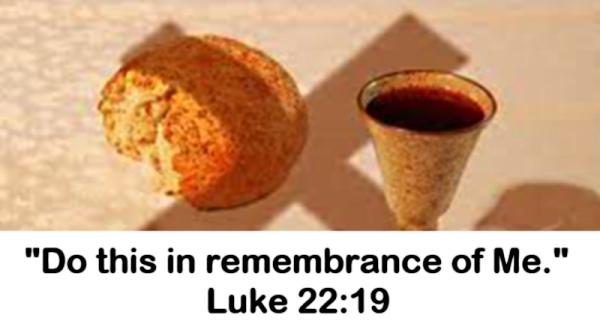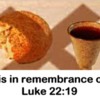Hi to my Forum Friends,
In the TimesDaily Religion Forum discussion begun by my Roman Catholic Friend titled "The Last Sacrament" -- he repeats a question I had posed to him in another discussion:
I am just curious. What do YOU think Jesus meant when He told the people in Capernaum, "Truly, truly, I say to you, he who believes has eternal life" (John 6:47)?
And, he continues with a copy/paste from a Roman Catholic web site.
Then, I post:
When I wrote, "Just curious. What do YOU think Jesus meant when He told the people in Capernaum, 'Truly, truly, I say to you, he who believes has eternal life' (John 6:47)?" -- I was NOT asking what the Vatican Party Line is -- but, what YOU think it means?"
He responds, "What I thought Jesus meant in John 6 is exactly what Jesus meant. I don't twist and lie about (the) Bible like you do, billie. So, it's the only answer possible."
Thank you for responding. I suppose we are making some progress. You quote from the New American Bible, Revised Edition (NABRE) which is the translation used often by Roman Catholics in America, "John 6: 47, 'Amen, amen, I say to you, whoever believes has eternal life.' "
And, you tell me, "OK billie, what you need to determine first is,'whoever believes' in what? Jesus is asking whoever believes, but for eternal life, what are you asked to believe?"
Actually, in most Bible translations John 6:47 reads, "Truly, truly, I say to you, he who believes has eternal life."
But, regardless of which translation, "whoever believes has eternal life" or "he who believes has eternal life" -- Jesus is not asking a question. He is stating a fact. Actually He is making a promise, "he, or whoever, believes HAS eternal life."
Keep in mind that "eternal" means "never ending." So, here Jesus Christ is telling us that "he who believes HAS eternal, never ending life." So, since it is, according to Jesus, NEVER ending life -- how can one lose it?
But, you ask what we must believe to be saved. That is a valid question. If we look at two other often used translations, it tells us more:
John 6:47 (kjv), "Verily, verily, I say unto you, He that believeth on me hath everlasting life."
John 6:47 (nkjv), “Most assuredly, I say to you, he who believes in Me has everlasting life."
But, what does it mean to believe in Jesus, or to believe on Jesus? Does believing that God exists, or that Jesus Christ is the Son of God, save us? No, for Satan and his demonic angels believe that God and Jesus Christ are real. Actually, they know that God exists and that Christ is the Son of God -- for they have walked with them, communed with them, face to face. Yet, beyond any doubt, they, Satan and his fallen angels, are not and will never be saved.
So, what must WE believe to be saved?
Ephesians 1:13, "In Him, you also, after listening to (or hearing) the message of truth, the Gospel of your salvation -- having also believed, you were sealed in Him with the Holy Spirit of promise."
What does it mean "to be sealed by/with the Holy Spirit"?
How Does the Holy Spirit Seal Believers?
http://www.answersingenesis.or...pirit-seal-believers
In Ephesians, Paul described the roles each member of the Trinity plays in salvation -- the Father (Ephesians 1:3–6), the Son (Ephesians 1:7–12), and the Holy Spirit (Ephesians 1:13–14). God’s Word is truth (John 17:17), and faith in Jesus Christ comes from hearing the “word of truth,” as Paul states, “So then faith comes by hearing, and hearing by the word of God” (Romans 10:17). For those who receive Jesus Christ as their Savior, they are “sealed with the Holy Spirit.”
For this devotional, we will look at two Greek words, which will help us understand what Paul means. First, the Greek word for seal is "sphragizo," which means to stamp for security, ownership, or preservation. This stamp is the Holy Spirit, and He dwells within believers (John 14:17). Paul writes the following to the believers at Corinth:
"Now He who establishes us with you in Christ and has anointed us is God, who also has sealed us and given us the Spirit in our hearts as a guarantee" (2 Corinthians 1:21–22).
In other words, God has sealed believers with the Spirit, who dwells within their hearts as a guarantee. Second, the Greek word for guarantee is "arrabon," which means a pledge (i.e., something delivered -- a down payment -- as security for the payment of a fulfillment of a promise). God will surely deliver on His promise of salvation, as believers are “sealed with the Holy Spirit of promise.”
In other words, God has sealed the believer by putting His seal, the Holy Spirit, within each believer. And, the Holy Spirit being omnipotent -- cannot be evicted.
From the Scripture verse found in Ephesians 1:13, it is obvious that a person who hears the Gospel and believes what God has done in His Gospel -- is saved and sealed with the Holy Spirit. But, what is the Gospel?
Romans 10:9-10, "That if you confess with your mouth Jesus as Lord, and believe in your heart that God raised Him from the dead, you will be saved; for with the heart a person believes, resulting in righteousness, and with the mouth he confesses, resulting in salvation."
1 Corinthians 15:1-8, "Now I make known to you, brethren, the Gospel which I preached to you, which also you received, in which also you stand, by which also you are saved, if you hold fast the word which I preached to you, unless you believed in vain. For I delivered to you as of first importance what I also received, that Christ died for our sins according to the Scriptures, and that He was buried, and that He was raised on the third day according to the Scriptures, and that He appeared to Cephas, then to the twelve. After that He appeared to more than five hundred brethren at one time, most of whom remain until now, but some have fallen asleep; then He appeared to James, then to all the apostles; and last of all, as to one untimely born, He appeared to me also."
So, what must we believe to be saved? We must believe the Gospel of Jesus Christ: That He was born of a virgin, that He was crucified on the cross to buy our pardon, that He rose from the grave, and that He ascended into heaven where He sits on the right hand of God the Father, interceding for all believers, our only Mediator between God and man.
And, we must believe what He has told us in John 19:30, "It is finished!" -- meaning that His work of making salvation available to all people was finished on the cross. He resurrected, that we may resurrect, and is now in heaven where He is interceding for all believers. He will come again, the Redeemer Kinsman, to redeem all His people, His church, and take us into heaven. There we will receive our glorified, immortal bodies and will spend eternity in the presence of God.
My Friend, that is what it means to believe unto salvation.
Then, my Friend, you tell me, "I've told you many times before, the chapter of John 6 was Jesus explaining the sacrament (of the Eucharist) because he knew some people would not believe it. He knew he needed time and he needed to start from the beginning. The institution, or creation, of the Holy Eucharist was the Last Supper. Luke 22:19-20. Read the thread. Continuously blaming the Vatican, where it doesn't even fit, for your childish rants about your inept Bible theories. Now you know what you've always known. How Jesus instituted the sacrament of the Eucharist."
Once again I will share with you what we learn in John chapter 6. John 6:1-14 tells of Jesus feeding the 5000 on the eastern s**** of the Sea of Galilee. John 6:15-21 tells of Jesus and His apostles traveling from that location to the city of Capernaum on the western s**** of the Sea of Galilee.
And, John 6:22-40 begins, in verse 22, with "The next day. . . " This is the next day after He had fed the 5000 and they had followed Him to Capernaum -- seeking to get more material miracles from Him. They were not believers, but they saw Him as a miracle worker and wanted to benefit from that.
Jesus uses this event, His miraculous feeding of the 5000 -- and compares that to God feeding the Israelites in the wilderness for 40 years, giving them daily manna to sustain them. The manna was physical food and they had to be given new manna daily for it would not last.
His feeding of the 5000 implied "eternal spiritual food" to all who would believe. That "eternal spiritual food" He offered is a "saving relationship" with Him as Lord and Savior. All who have that "saving relationship" WILL spend eternity in His presence.
Jesus compared the physical food, manna, sent from heaven by God and having to be replenished daily -- with the spiritual food God sent from heaven which would sustain them forever. What was that spiritual food? It was Jesus Christ, come as the Incarnate God, sent from heaven to offer eternal life to all who will believe. Those who eat of this food, this spiritual food, will never hunger spiritually again.
Since the crowd still had miraculous food on their minds from the day before -- Jesus compared Himself, the spiritual food sent from God, to that physical food He had given the 5000 the day before. Since their minds were on miraculous food -- He compared His body to the bread they had eaten the day before; and He compared His blood to the wine they most likely drank with that bread. This was a metaphorical example which rang a bell with them -- since they had so recently been given miraculous physical food.
This had nothing whatsoever to do with the Lord's Supper which would take place months later at the Passover. Yes, He used that same example of His body and blood -- but, He made sure that His apostles understood that He was speaking metaphorically -- for, at the Lord's Supper in Jerusalem, He concluded by telling them, "Do this in remembrance of Me" (Luke 22:19).
This is also reflected in 1 Corinthians 11:25, "In the same way He took the cup also after supper, saying, 'This cup is the new covenant in My blood; do this, as often as you drink it, in remembrance of Me.' ”
A parallel Scripture passage is found in Matthew 26:26-29:
Matthew 26:27-29, "And when He had taken a cup and given thanks, He gave it to them, saying, 'Drink from it, all of you; for this is My blood of the covenant, which is poured out for many for forgiveness of sins. But I say to you, I will not drink of this fruit of the vine from now on until that day when I drink it new with you in My Father's kingdom.' "
h. Until that day when I drink it new with you in My Father's kingdom: Jesus looked forward to a future celebration of the Passover in heaven, one that He has not yet celebrated with His people. He is waiting for all His people to be gathered to Him and then there will be a great supper - the marriage supper of the Lamb (Revelation 19:9). This is the fulfillment in My Father's kingdom that Jesus longed for. (David Guzik, Study Guide for Matthew 26 - http://www.blbclassic.org/comm...31&topic=Matthew)
From this passage it is clear that Jesus, as well as His apostles, ate of the bread and drank of the wine as He was instituting the ordinance of the Lord's Supper. Was He eating His own body and drinking His own blood, and before He had been crucified? Or was He telling them, and us, that these elements are symbolic of His sacrifice when He gave His body and blood -- as an atonement for our sins?
And, here, He is telling us that He will not drink of this wine, He will not drink of this cup (symbolic of His blood, Matthew 26:39) again -- until He does it with His bride, the body of church age believers, in heaven, after the Rapture.
Another clue that John 6 is not speaking of the Lord's Supper is that the event which occurs in John 6 happens in the city of Capernaum -- and not in Jerusalem, where the Passover meal was eaten and where Jesus Christ did institute the Lord's Supper, i.e., Communion, which we do in remembrance of Him until He comes again.
So, my Friend, it is really a stretch of the imagination to attempt to squeeze the Lord's Supper, and your Eucharist, into John chapter 6 -- just because Jesus used similar metaphors, i.e., similar words.
I pray that you have a better understanding of what it means to believe in Christ -- and a fuller understanding that salvation is by the grace of God, through faith in the finished work of Jesus Christ on the cross - plus nothing else (Ephesians 2:8-9). It is a gift of God to all who will believe and receive His "paid in full" pardon for our sins and His free gift of eternal life to all who will believe.
And, I pray that you have a better understanding of John chapter 6 -- and Jesus' teaching of Himself as the "spiritual food" sent from God to offer the gift of eternal, never ending, life to all who, by the grace of God, through faith in Jesus Christ -- will believe and receive His eternal gift.
God bless, have a wonderful, blessed day,
Bill










